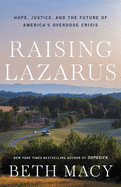
In the incisive Raising Lazarus, Beth Macy shines a spotlight on the stories of those battling the opioid crisis and the forces that hinder them. The crisis has continued to rage since Macy's first book on the subject (Dopesick), and lawsuits drag on against pharmaceutical companies. The owners of Purdue Pharma, the Sackler family, have begun to face a certain level of public shaming, including the removal of their name from some of the many institutions to which they purchased naming rights. Macy reports that substance-use disorder rates rose even higher at the beginning of the covid-19 pandemic and that the responses of law enforcement and medical experts to people who use drugs are frequently at odds.
Macy acknowledges that this is a bleak landscape: "This was supposed to be a hopeful book. It says so right there in the subtitle." The hope can be difficult to find amid the relapses, the minimal accountability for those who proliferated opioids and the resistance to medical treatments for opioid-use disorder. Yet Macy does shine a light on personal stories that give at least some reason to hope, particularly of those who tirelessly carry out harm-reduction campaigns in the face of opposition from the Not in My Back Yard forces or those attempting to be tough on crime.
Those who have read Dopesick or watched its Hulu adaptation will find everything they expect from Macy's keen and sensitive journalism in Raising Lazarus. --Kristen Allen-Vogel, information services librarian at Dayton Metro Library

